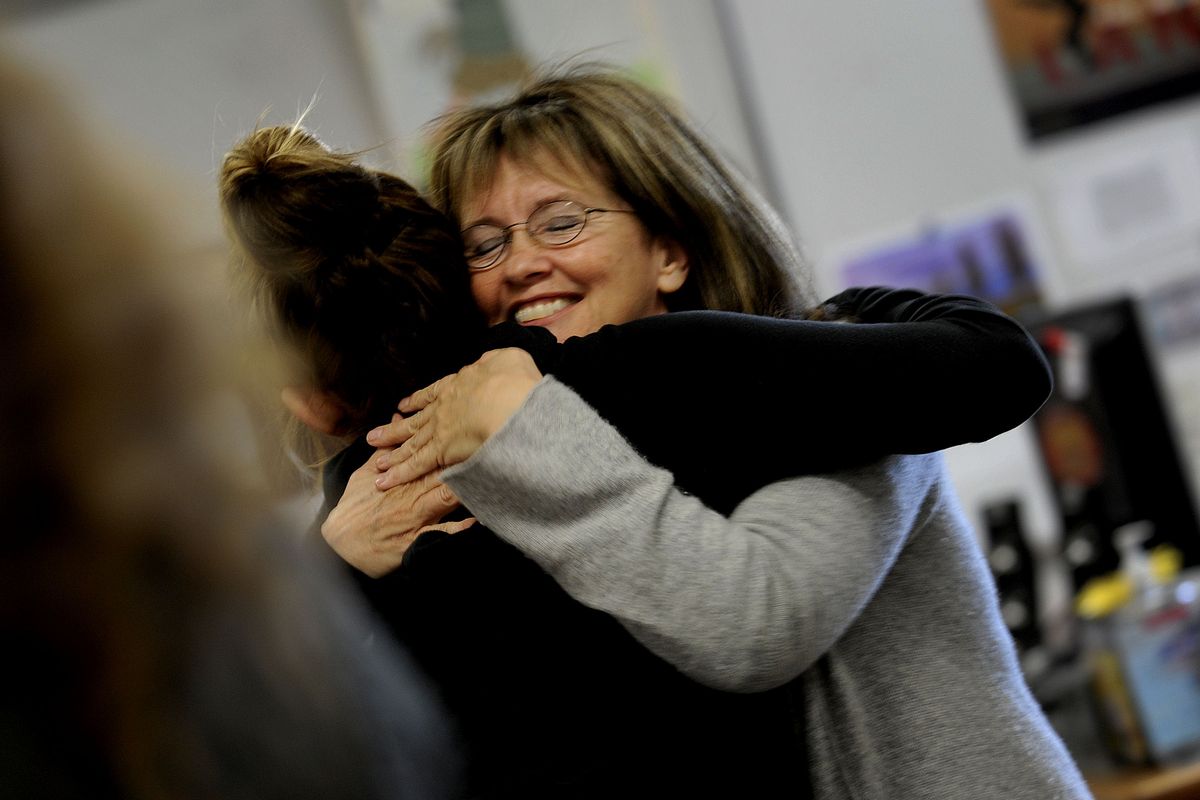Leslie Villelli’s ‘Happy on Purpose’ course stresses conscious decisions that can affect the brain

Leslie Villelli regularly attempts what some might consider an impossible task: making teenagers happier.
The longtime life coach helps students see that they can control their negative thoughts and re-train their brains.
Villelli just completed her three-day “Happy On Purpose” classes at Post Falls High School.
“She makes you realize that wallowing in your own self-pity is a choice,” said teacher Anne Rosenbaum, who invited Villelli in during her Relevant Education and Life class. “If you want to be happy, you have to make a conscious decision to do that.”
That’s the message received by Post Falls student Maddisun Nagrone, 15: “You can tell your brain to be happy and it will be,” she said.
Villelli’s classes aren’t a hoax; she has neuroscience to back her teachings.
“Stress, fear, the ‘fight, flight or freeze’ response we humans have to challenges literally causes chemical reactions in our bodies that numb the areas of our brains we need for creativity, cooperation, collaboration and connection – all the things that make us happy,” Villelli said. “The really good news is how super easy it is to interrupt that response and get ourselves our whole brains back.”
Joe Dispenza, who studied biochemistry at Rutgers University, is also speaking about how happiness affects the brain. He lectures all over the world on the approach – that thinking in new, different ways can literally change one’s brain.
“Scientists predict that they’ve just scratched the surface of our ability to measure those amazing benefits,” Villelli said. “What we do know, now, is that the chemicals we manufacture internally when we are happy … are health-giving, energy-giving substances.”
Villelli came upon the science by accident. On her wedding anniversary with her late second husband, the 62-year-old realized how quickly she went from feeling good to feeling bad by shifting her thoughts.
After waking up, she asked herself: “What day is today? It was our anniversary,” she said. “Then my next thought was: ‘I will never see him again.’ Then I thought how much fun we had. Then I thought about how he danced the can-can. Then I thought about he will never dance with me again. It became crystal clear to me that each thought caused a feeling.”
Villelli made a conscious effort to spend the first minute of every morning saying: “I’m happy. I love my life.” She did additional research and added a physical motion – the hand jive – to go with her daily saying.
“Now if something yucky happens to me, my hands automatically start doing the hand jive.
“I had no idea this was neuroscience,” Villelli said.
She first took her life lesson and the science to Erin Roos’ classroom at Sandpoint High School, and through word-of-mouth has since taught classes at City School in West Valley School District; Clark Fork High School; Bonners Ferry High School; and Post Falls High School and alternative high school.
The first day, she talks about how you can control your happiness, Rosenbaum said. She gives students techniques on how to change thinking, including her own personal method and the difference between fast thinking and slow thinking.
Villelli uses the example of a student who says hi to someone in the hall and gets no response. The fast brain thinks: They’re snubbing me. If a person takes a few minutes to think about it, they realize the lack of response probably had nothing to do with them at all.
“Our fast thoughts usually lead us to the negative, but if we slow down we can think of alternatives,” Rosenbaum said.
The second day, Villelli focuses on the science.
“I see them (the students) really thinking about their attitude differently,” Rosenbaum said. “I think they like that they have a choice. When there’s chaos around them, they may not be able to do anything about it, but they can control how they think.”
Said student Tori Taylor, 15, “I think this is inspiring. She makes me think things can be possible instead of impossible.”
Villelli’s words and her hugs speak for themselves, Rosenbaum said. “She’s so happy and bubbly. The kids can sense she’s not just blowing smoke.”